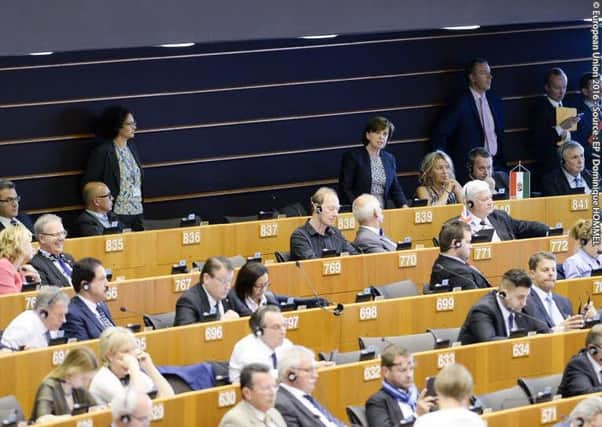Watch: Anderson and Dodds divide over new Irish Sea prospect


Londonderry-based Sinn Féin MEP, Martina Anderson, and DUP MEP Diane Dodds, both spoke during a divisive extraordinary plenary session of the European Parliament in the wake of the Brexit result.
The MEPs are on either side of a post-referendum argument that suggests an entirely new Irish Sea world may be in chrysalis.
Advertisement
Hide AdAdvertisement
Hide AdMrs Anderson suggested to MEPs that such would be the impact of Brexit that a new alignment between the island of Ireland and Scotland may be the natural outcome; Mrs Dodds, that new opportunities for cooperation between Northern Ireland, the Republic of Ireland and Great Britain are more likely.


Mrs Dodds said: “The people of the United Kingdom have given their verdict and their decision cannot be rewritten. They have recognised that the EU’s problems are not just imperfections and they have said - ‘let’s chart our own course.’
“This referendum represents a victory for democracy. The outcome was not the one that our outgoing Prime Minister had hoped for, yet he should be praised for giving the British people their say.
“For years the people of the United Kingdom have been trying to tell you of their frustrations and concerns about the EU.
Advertisement
Hide AdAdvertisement
Hide Ad“You turned a deaf ear, but today, you are listening. The United Kingdom can now lift its eyes and be outward-looking in its ambitions. New markets. New opportunities. A positive future.


“Now, though, is a time for cool heads. These institutions must resist the urge for knee-jerk reactions. Our nation has not turned its back on Europe. We are not inward-thinking. We have for a long time sought a new relationship with our European allies. A positive relationship based on self-governance, free trade and co-operation - to make our world more secure and more prosperous.
“That doesn’t make us any less European and it doesn’t make us any less optimistic. History proves that an independent United Kingdom not only has the strength of character to succeed for ourselves, but also the inherent humanity to defend the freedoms of our neighbours. This should not be forgotten.
“Let us look forward to a new era; one in which the EU and the UK work closely and calmly to the benefit of all of our people.”
Advertisement
Hide AdAdvertisement
Hide AdBut Mrs Anderson and her colleagues in the European United Left/Nordic Green Left attempted to pass a resolution noting “that the people of the north of Ireland voted to remain in the EU; that the British Government has forfeited any mandate to represent the interests of the people in the north of Ireland with regard to the EU; that there is a democratic imperative for a referendum on Irish unity as provided for in the Good Friday Agreement; and that called for the EU to continue to support the peace process in Ireland.”
The motion fell despite garnering the support of over 200 MEPs.
But Mrs Anderson insisted: “Our amendments urged that the Parliament take note of, and respect, the result of the referendum and respects the fact that the north of Ireland and Scotland voted to remain in the EU.
“In saying this, we also emphasised how the British government have forfeited any mandate to represent the interests of people in the north of Ireland and in Scotland with regard to the EU.
Advertisement
Hide AdAdvertisement
Hide Ad“The Brexit result threatens to jeopardise the peace process and therefore our motions called on the EU to continue to proactively support the peace process and to provide for its continuation in any negotiations on British withdrawal. Over 200 MEPs also voted in favour of this amendment, highlighting the regard at which the Peace Process is held, right across Europe.
“The result of the referendum also dislocates the northern and southern economies, which currently have 200,000 jobs depending on €1.2 billion of trade between them each week. This proves that Irish unity is not only practically viable, it is also economically viable and there is a democratic imperative for a referendum on Irish unity as provided for in the Good Friday Agreement, which we also highlighted today.”